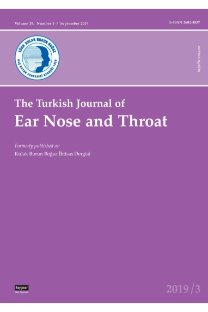Baş-boyun ışınlaması yapılan sıçanlarda serum eser elementleri üzerine arı sütünün etkisi
Amaç: Bu çalışmada baş-boyun ışınlaması yapılan sıçanlarda radyasyonun serumda eser elementler üzerindeki etkisi ve bu elementlerdeki arı sütü ile ortaya çıkan değişiklikler incelendi.Gereç ve Yöntemler: Çalışmaya 32 adet, sekiz haftalık ve ortalama 275±35 g ağırlığında Sprague-Dawley cinsi erkek sıçan alındı. Denekler her grupta sekizer adet olmak üzere, dört gruba ayrıldı: grup 1: kontrol grubu K , grup 2: sadece radyasyon uygulanan RT , grup 3: radyasyon ile birlikte 50 mg/kg arı sütü verilen RT+AS50 ve grup 4: sadece 50 mg/kg arı sütü verilen AS50 grup olarak belirlendi. Radyoterapi sıçanların baş-boyun bölgesine tek fraksiyonda 22 Gy doz olarak verildi. Arı sütü günde bir defa olmak üzere, yedi gün süreyle verildi. Çalışmanın yedinci gününde denekler sakrifiye edildi. Kan örneklerinde ICP/MS yöntemi ile eser element düzeyleri ölçüldü.Bulgular: Gruplardaki eser element düzeyleri ANOVA testi ile karşılaştırıldığında Al, As, Ca, Cd, Cr, K, Mg, Pb, Se ve Sn düzeylerinde istatistiksel olarak anlamlı fark bulundu p0.05 . Radyasyon ile birlikte arı sütü verilen grupta, tek başına radyasyon uygulanan gruba kıyasla, oksidatif stresin azaldığı gözlendi.Sonuç: Çalışma bulguları, baş-boyun ışınlamasının eser element düzeylerinde birtakım değişikliklere neden olup, oksidatif stresi artırdığını; arı sütünün ise, radyasyonun oluşturduğu oksidatif strese karşı koruyucu etkisinin olduğu göstermektedir
Anahtar Kelimeler:
Baş-boyun tümörü, radyoterapi, arı sütü, eser element
Effect of royal jelly on serum trace elements in rats undergoing head and neck irradiation
Objectives: This study aims to investigate the effects of radiation on serum trace elements and the changes in these elements as induced by royal jelly in rats undergoing head and neck irradiation. Materials and Methods: Thirty-two Sprague-Dawley male rats at the age of eight weeks with a mean weight of 275±35 g were included in the study. Subjects were divided into four groups with eight rats in each group: group 1: controls C , group 2: radiation-only RT , group 3: radiation plus royal jelly 50 mg/kg RT+RJ50 and group 4: royal jelly 50 mg/kg-only RJ50 . Radiotherapy was applied to the head and neck area by single fraction at a dose of 22 Gy. The royal jelly was given once daily for seven days. The subjects were sacrificed on the seventh day of the study. Trace elements in blood samples were measured using ICP/MS method. Results: When the trace element levels among the groups were compared using ANOVA test, a statistically significant difference was found in Al, As, Ca, Cd, Cr, K, Mg, Pb, Se, and Sn levels p0.05 . It was observed that oxidative stress was reduced in the radiation plus royal jelly group, compared to the radiation-only group. Conclusion: Our study results suggest that head and neck irradiation increases oxidative stress, leading to some changes in the trace element levels, while royal jelly exhibits a protective effect against the oxidative stress induced by radiation.
Keywords:
Head and neck tumor, radiotherapy, royal jelly, trace element,
- ISSN: 2602-4837
- Yayın Aralığı: Yılda 4 Sayı
- Başlangıç: 1991
- Yayıncı: İstanbul Üniversitesi
Sayıdaki Diğer Makaleler
yi diferansiye nöroendokrin tümör: Larenksin nadir görülen bir tümörü
Tuba BAYINDIR, Neşe KARADAĞ, Erkan KARATAŞ, Ahmet KIZILAY
Mete İŞERİ, Selçuk UÇAR, Serhan DERİN, Mehmet Emre ÜSTÜNDAĞ
Baş-boyun ışınlaması yapılan sıçanlarda serum eser elementleri üzerine arı sütünün etkisi
Yasemin BENDERLİ CİHAN, Celalleddin CİHAN, Hasan MUTLU, Dilek ÜNAL
Kronik otitis mediada temporal kemik tomografisinin klinik değeri
Cüneyt KUCUR, Eda ŞİMŞEK, Ozan KUDUBAN, İrfan ÇELEBİ, Ali Okan GÜRSEL
Işılay ÖZ, Alper Nabi ERKAN, Haluk YAVUZ, İsmail YILMAZ, Levent Naci ÖZLÜOĞLU
Abdülkadir İMRE, Ercan PINAR, Çağlar ÇALLI, Engin Umut SAKARYA, Sedat ÖZTÜRKCAN, Semih ÖNCEL, Hüseyin KATILMIŞ
